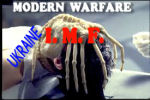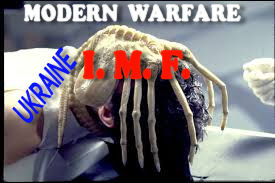
Video interview inside.Western support will allow more IMF and European lending to prop the Ukrainian currency so the Ukrainian oligarchs can move their money safely to British and US banks, explains economist and author, Professor Michael Hudson. '[...] Finance today is war by non-military means. The aim of getting a country in debt is to obtain its economic surplus, ending up with its property. The main property to obtain is that which can produce exports and generate foreign exchange. For Ukraine, this means mainly the Eastern manufacturing and mining companies, which presently are held in the hands of the oligarchs. For foreign investors, the problem is how to transfer these assets and their revenue into foreign hands – in an economy whose international payments are in chronic deficit as a result of the failed post-1991 restructuring. That is where the IMF comes in.'
'[...]Governments are told to balance their budgets by selling off public assets – mainly natural monopolies whose buyers can raise excess prices to extract economic rent. The effect is to turn the economy into a renting “tollbooth economy.” Hitherto free public roads are turned into toll roads, and other transportation, water and sewer systems also are privatized. This raises the cost of living, and hence the cost of labor – while overall wage levels are squeezed by the financial austerity that shrinks markets and raises unemployment."
"What is at issue is whether economies throughout the world will let financial leverage dismantle the power of elected governments, and hence of democracy. Governments are sovereign. No government actually needs to pay foreign debts or submit to policies that negate the three definitions of a state: to create its own money, to levy taxes, and to declare war."
(Article by Michael Hudson, first published on Global Research, July 7, 2014.) Original videoed interview by RT's Daniel Bushell (Truthseeker program) was on June 29, 2014.
Western support for oligarchs via IMF

Western support will allow more IMF and European lending to prop the Ukrainian currency so the Ukrainian oligarchs can move their money safely to British and US banks, economist and author Michael Hudson told RT’s Truthseeker.
RT:Could you summarize for us the tried and tested steps that will lead from IMF loans, to Ukraine’s best assets ending up in private Western hands – the IMF’s ‘knee-breaker’ role as you memorably described it as?
Michael Hudson: The basic principle to bear in mind is that finance today is war by non-military means. The aim of getting a country in debt is to obtain its economic surplus, ending up with its property. The main property to obtain is that which can produce exports and generate foreign exchange. For Ukraine, this means mainly the Eastern manufacturing and mining companies, which presently are held in the hands of the oligarchs. For foreign investors, the problem is how to transfer these assets and their revenue into foreign hands – in an economy whose international payments are in chronic deficit as a result of the failed post-1991 restructuring. That is where the IMF comes in.
The IMF was not set up to finance domestic government budget deficits. Its loans are earmarked to pay foreign creditors, mainly to maintain a country’s exchange rate. The effect usually is to subsidize flight capital out of the country – at a high exchange rate rather than depositors and creditors getting fewer dollars or euro. In Ukraine’s case, foreign creditors would include Gazprom, which already has been paid something. The IMF transfers a credit to its “Ukraine account,” which then pays foreign creditors. The money never really gets to Ukraine or to other IMF borrowers. It is paid to the accounts of foreigners, including foreign government creditors, as in IMF loans to Greece. Such loans come with“conditionalities” that impose austerity. This in turn drives the economy even further into debt – forcing the government to tighten the budget even more, run even smaller budget deficits and sell off public assets.
RT: Can Ukraine expect the so-called ‘IMF effect’ of 1 in 5 of the impoverished population emigrating to work abroad, and what consequence could this have on a country to lose its brightest minds?
MH: Ukraine already draws in foreign emigrants’ remittances equal to about 4% of its GDP. (About $10 billion a year.) Most of this money comes from Russia, the rest from Western Europe. The effect of IMF austerity plans is to drive more Ukrainians to emigrate in search of work. They will send some of their earnings back to their families, strengthening the Ukrainian currency vis-à-vis the ruble and euro.
RT: How are the IMF’s tools in reality “weapons of mass destruction” as you quoted it?
MH: Lower budget deficits cause even deeper austerity and unemployment. The result is a downward economic spiral. Lower incomes mean lower tax revenues. So governments are told to balance their budgets by selling off public assets – mainly natural monopolies whose buyers can raise excess prices to extract economic rent. The effect is to turn the economy into a renting “tollbooth economy.” Hitherto free public roads are turned into toll roads, and other transportation, water and sewer systems also are privatized. This raises the cost of living, and hence the cost of labor – while overall wage levels are squeezed by the financial austerity that shrinks markets and raises unemployment.
RT: The IMF’s perhaps also a weapon of mass destruction in a more literal sense. The organization has publicly threatened and blackmailed Ukraine that it will ‘re-design’ its aid package, unless Kiev goes to war on fellow Ukrainians in the East of the country and stops them protesting. Does that not make it now literally a criminal accomplice or instigator of war and murder?
MH: The IMF’s “conditionality” is that it “pacify” the East. Pacification may occur violently in today’s Orwellian rhetoric. The only way in which actual political and economic peace can be achieved is by a loose federalization of Ukraine, to make each region independent of the kleptocrats in Kiev, who are appointed mainly from the West.
As for accusations of criminality, this always depends on who is the prosecutor, and what is the court! No country has yet prosecuted the IMF. All that voters can do is reject governments submitting to IMF conditionalities. Many voters who are able will “vote with their feet” and simply leave the sinking economy. So the IMF’s defense is that Ukraine and other clients are voluntarily committing suicide rather than being murdered. Austerity is ultimately a policy – nobody is holding gun to their head, except when political leaders are assassinated as in Chile in 1974 under Pinochet with the US Government behind it. In this sense, Ukraine today is a replay of Chile four decades ago.

Participants in the nationwide Ukrainian rally against bank outrage and for the rights of borrowers under the slogan “No to currency slavery!” by the building of Ukraine’s Verkhovna Rada. (RIA Novosti)
RT: Everyone knows austerity’s effects on Greece and elsewhere; polls show most Ukrainians don’t want it; even the IMF itself now admits austerity doesn’t work. Why will Ukraine’s leaders allow it to happen, are they guaranteed a cushy job in the West when they’ve voted out or something?
MH: Ukraine’s leaders are mainly kleptocrats. Their aim is not to help the country, but to help consolidate their own power. George Soros has written that their best way to do this is to find Western partners. This will provide US and European backing for the kleptocrats tightening their hold on the economy. Western support will provide more IMF and European lending to support the currency so that the Ukrainian oligarchs can move their money safely to the West, to British banks and US banks.
RT: Do you think that the EU isn’t stupid enough to make Ukraine a full member, so under the one-sided association agreement, member states will just strip the country of its best assets, and use its workers as near slave labor, with Ukraine’s 91 US cents an hour minimum wage?
MH: The EU hardly can really make Ukraine a member. One reason is that a key policy underlying French and German creation of the original Common Market in 1957 was the Common Agricultural Policy (CAP). Ukraine has rich Western land, and that part of the country is largely still rural. Foreign investors would like to buy it out and “re-feudalize” it, creating large business farms. But the EU is unlikely to provide the subsidies that financed mechanization and capital investment in Western European agriculture.
The EU does not need to formally integrate with Ukraine to benefit from its inexpensive labor. Wrecking the economy Greek-style or Irish-style or Latvian-style is sufficient to send its workers to the West. And the most mobile traditionally are the best educated youth in their 20s, able to speak foreign languages and with skills in demand in the West.
RT: You noted Ukraine ‘must have asked the US first’ before blowing up that gas pipeline. Do you think NATO will support anything even terrorism to make Russian gas seem less reliable, especially while US fracking giants currently are waging a big PR campaign in Europe.
MH: The US has pressed Europe to make its own economy much more high-cost and to rely on US gas exports mainly in order to deprive Russia of foreign exchange. The NATO rationale is essentially that which Prime Minister Arseniy Yatsenyuk tweeted on Monday, June 16: Ukraine “won’t continue subsidizing Gazprom [to the tune of] $5 billion annually, so that Russia can arm itself against us [with this money].”
The US position today is what it was in 1991: Without manufacturing, Russia cannot be a serious military power to defend itself. And without purchasing foreign technology and without large state subsidy – as US and European governments provide their own economies – Russia cannot create a manufacturing economy. So NATO is trying to prevent Russia from earning enough money to modernize its economy, on the principle that any industrial power is potentially military, and any military power my potentially be used to achieve political independence from the US sphere.
RT: Anything else you would like to add?
MH: What is at issue is whether economies throughout the world will let financial leverage dismantle the power of elected governments, and hence of democracy. Governments are sovereign. No government actually needs to pay foreign debts or submit to policies that negate the three definitions of a state: to create its own money, to levy taxes, and to declare war.
At issue is who shall rule the world: the emerging 1% as a financial oligarchy, or elected governments. The two sets of aims are antithetical: rising living standards and national independence, or a renting economy, austerity and international dependency.

Add comment